 Petzlover
Petzlover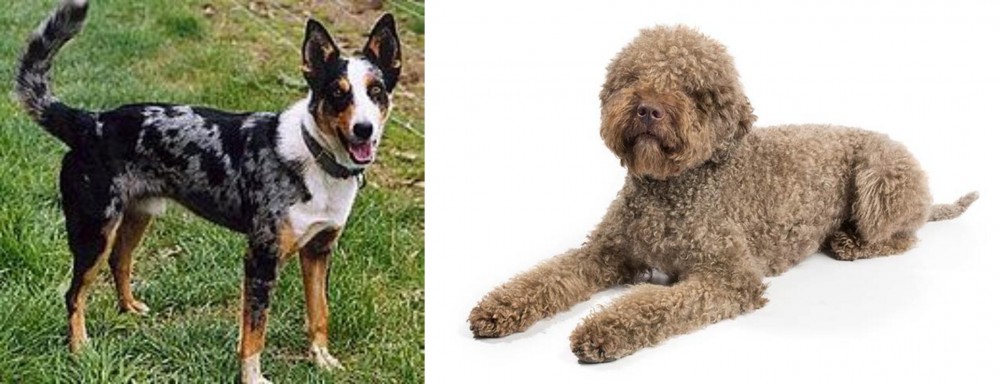 German Coolie is originated from Australia but Lagotto Romagnolo is originated from Italy. German Coolie may grow 12 cm / 5 inches higher than Lagotto Romagnolo. German Coolie may weigh 8 kg / 18 pounds more than Lagotto Romagnolo. Both German Coolie and Lagotto Romagnolo has almost same life span. Both German Coolie and Lagotto Romagnolo has same litter size. German Coolie requires Low Maintenance. But Lagotto Romagnolo requires Moderate Maintenance
German Coolie is originated from Australia but Lagotto Romagnolo is originated from Italy. German Coolie may grow 12 cm / 5 inches higher than Lagotto Romagnolo. German Coolie may weigh 8 kg / 18 pounds more than Lagotto Romagnolo. Both German Coolie and Lagotto Romagnolo has almost same life span. Both German Coolie and Lagotto Romagnolo has same litter size. German Coolie requires Low Maintenance. But Lagotto Romagnolo requires Moderate Maintenance
 The German Coolie is misnamed as it is an Australian bred dog and often called the Australian Koolie or Coolie. This Australian breed is more often just called a Coolie. The breed is a typical herding breed and a working dog that needs a job all the time. They have been a favorite of Australians since the late 1800’s when local dogs were bred with British working dogs.
The German Coolie is misnamed as it is an Australian bred dog and often called the Australian Koolie or Coolie. This Australian breed is more often just called a Coolie. The breed is a typical herding breed and a working dog that needs a job all the time. They have been a favorite of Australians since the late 1800’s when local dogs were bred with British working dogs.
Although all Coolie’s are not the same. Within the breed there is a lot of variation. This is because the Coolie was bred individually for different regions in Australia. In a very different writing the Koolie Club of Australia does not define the Coolie breed on confirmation as all other purebred dogs are defined. Instead the Coolie is defined by ability to work. In light of this most Coolie breeders state that the Coolie is a breed and the variations you see among regions are types within the breed.
As a herding dog, the Coolie brought a lot of skill to the Australian farmers and sheep herders. The Coolie will round up the sheep and bring them back to their enclosure at the shepherd’s command. They are upright, silent, working dogs. Not only do they herd sheep they are important at sheering to “cut out” the sheep or assist in the close quarters of lambing.
In Queensland North and New South Wales, the Coolie is medium boned, tall and agile ready to herd cattle over a long stretch of miles. In the Snowy Mountains of New South Wales and the Hunter Valley Region, the Coolie is shorter and thicker in order to be able to get cattle that are lying low out from the gullies and dense bush. The Coolies found in Victoria are the smallest of all.
No matter where they live and work, the Coolie is bred to help the workers there, the farmers, the stockman, and the grazier. All Coolies are adaptable and very agile. They all have a strong willfulness to accomplish what they are asked to do. The ancestors of these various Coolie was the British Collie – a smooth coated, blue merle. This Collie was crossed with the Black and Tan Collie from the Scottish Highlands. It is believed that these are the same Collie breeds that came to Australia to create the Heeler.
The name may come from the German immigrants working in South Australia and unable to pronounce Collie incorrectly they called the dogs German Coolies. There is also a fraction of German breeders who believe that the German Tiger dog was brought to Australia in the 18th century and then when the Collies came they were bred together. Many Coolie breeders have records showing that the breed has been in Australia for at least 160 years. It is also believed that the Border Collie and Kelpie (Blue Heeler) were mixed into the breed at sometime as well.
No bench standard exists for the German Coolie even though there is the Koolie Club of Australia. The mission of the club is to protect, preserve and promote the breed. The Australian Sporting Register was recognizing the Coolies in 2004. They are eligible to participate in the Australian National Kennel Council sanctioned sporting trials. They participate in Queensland, New South Wales and Victoria through the individual states sporting register. Here they participate in herding, jumping, obedience, agility and tracking.
Several other recognitions as a herding breed soon followed. The Australian Shepherd Club of America, the American Herding Breed Association, were followed by recognition from others as well. They are not recognized by the American Kennel Club (AKC).
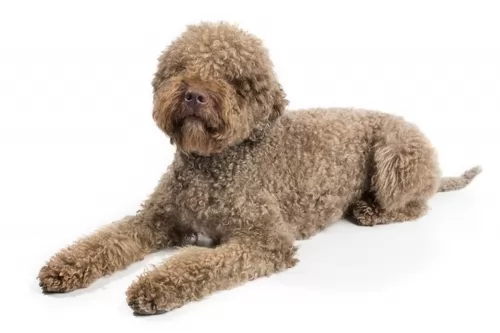 The Lagotto Romagnolo dog, known as the Water Dog of Romagna, and falling into the sporting dog category, is a pure breed dog which comes from the Romagna region of Italy.
The Lagotto Romagnolo dog, known as the Water Dog of Romagna, and falling into the sporting dog category, is a pure breed dog which comes from the Romagna region of Italy.
The dog’s role was that of gun dog and to retrieve water birds. Today he is more used as a truffle hunter in Italy as well as being used for a therapy dog.
In 2015 the Lagotto Romagnolo was accepted by the American Kennel Club into the sporting dog category.
 With their strong ancestry among the family of collies and herders, the German Coolie shares the look of collies and shepherds. Even though they differ from region to region and there is no actual standard, they are medium sized dogs with blue or brown eyes or even one of each. The ears are folded over on top when relaxed but they are rigid and straight when he is more alert. The nose is either chocolate or red depending on the color of their coat.
With their strong ancestry among the family of collies and herders, the German Coolie shares the look of collies and shepherds. Even though they differ from region to region and there is no actual standard, they are medium sized dogs with blue or brown eyes or even one of each. The ears are folded over on top when relaxed but they are rigid and straight when he is more alert. The nose is either chocolate or red depending on the color of their coat.
They can have either a long, medium or short coat but most owners want the short coat that is smooth as well. The coat can be one color – red/chocolate or black; Bi – red/white or black/white; Tri – solid black or red with white and brown; Tri merle -merle with white and brown; Merle – red merles and blue merles. Regardless of color, the German Coolie has the look of a collie or German Shepherd.
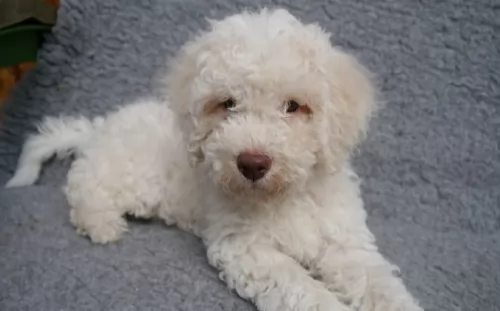 The Lagotto Ramagnolo is a medium sized dog where both males and females stand anything between 41 and 48cm and weigh 11 to 16kg.
The Lagotto Ramagnolo is a medium sized dog where both males and females stand anything between 41 and 48cm and weigh 11 to 16kg.
He is well proportioned and muscled, he has large yellow or brown eyes with a black or brown/pinkish nose, floppy, rounded ears and a tail which is left long these days.
The Lagotto Romagnolo has a waterproof double coat with a woolly texture and which hardly sheds, putting him as being hypoallergenic.
The coat can be in a number of different colors such as cream, grey, white, apricot, brown or tan. The face of the dog has a bit of a beard as well as noticeable bushy eyebrows.
Because the Lagotto is a sporting breed, he has had to call on all his senses to retrieve water birds. Good eyesight, sharp listening skills and an excellent sense of smell makes him the ideal gun dog but he also makes a loyal family pet.
He makes a good playmate for children and he happily gets on well with other pets in the home. Being an intelligent dog, he is easy to train too.
The sporting past of his has made it that he isn’t a couch-potato type of dog and he will require mental- and physical stimulation. His role as gun dog meant that he was required to retrieve birds in water, and he is an excellent swimmer and will happily plunge into water to join you in a swim.
Have him trained and socialized and you’ll find him tuned in to obeying your commands. Because of his smallish size, the Lagotto can adjust well to life in the city or in the countryside, just so long as he still receives his full quota of exercise.
 Yes, they can be very friendly with children is they are socialized and supervised.
Yes, they can be very friendly with children is they are socialized and supervised.
They have enough stamina to work for 14 hours a day.
They are very adaptable. They can be calm and steady when working a mother and baby lamb and then be able to forcefully move steers, bull, rams or weathers.
The breed is highly intelligent, and their learning ability is excellent because they want to please you.
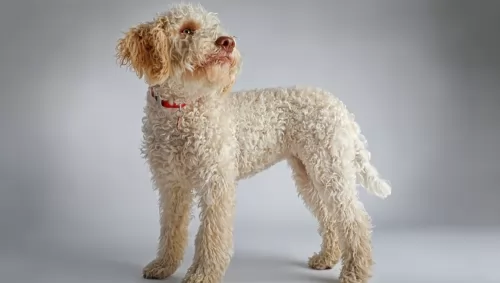 Many dog lovers appreciate that the Lagotto Romagnolos is looked upon as an allergy-friendly dog with his non-shedding coat.
Many dog lovers appreciate that the Lagotto Romagnolos is looked upon as an allergy-friendly dog with his non-shedding coat.
Being a medium sized dog, he is manageable too. Add to that excellent characteristics such as being amicable, friendly and loving. Training him some important, basic commands won’t be difficult either and you can add in intelligence to his list of good qualities.
As loving dogs, they are dedicated to their families, getting on well with children in the home as well as with other pets. He is a social dog and just longs to be a treasured member of the family like anybody else.
Count him in with all your activities and you’re going to have a one-in-a-million undemanding and contented canine friend.
 This is a relatively healthy breed without many genetic disorders found in purebreds due to the 160 years they have spent fairly isolated and allowing natural selection to take its course.
This is a relatively healthy breed without many genetic disorders found in purebreds due to the 160 years they have spent fairly isolated and allowing natural selection to take its course.
In Merle dogs there can be deafness and/or blindness. If you breed a solid to a merle you can eliminate that.
These are not inherited but rather acquired due to the immense amount of jumping and running.
Rare but it does occur and can be fatal if not treated
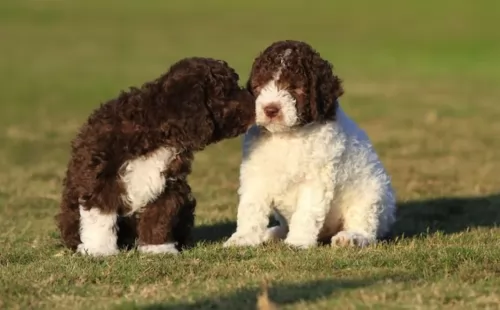 Lagotto live roughly 16 years with the best food, exercise and loving environment. Some health issues may well crop up, though unlikely, but it is good to be aware of them.
Lagotto live roughly 16 years with the best food, exercise and loving environment. Some health issues may well crop up, though unlikely, but it is good to be aware of them.
You hear the words ‘Hip dysplasia’ being bandied about a lot in the world of dogs because it is such a common dog ailment. Your dog can’t be cured but there are a range of management options that will ensure your pet remains as comfortable as possible.
It is such a common joint disease where the hips partially dislocate. Without veterinary intervention, it can be debilitating and painful. It is essentially a genetic condition but diet and environmental factors can come into play too.
You don’t want your pet putting on too much weight as this puts extra strain on the joints.
Your dog has loss of function because of the degeneration of cells or tissues. The illness affects different parts of the brain in dogs. You’ll notice a mild tremor of the head and uncoordinated movements. Your vet will want a history of your pet’s health as well as lab tests.
 Break meals into 3 a day feeding a high quality dry puppy food designed for dogs of his size. 11/2 to 2 cups per day.
Break meals into 3 a day feeding a high quality dry puppy food designed for dogs of his size. 11/2 to 2 cups per day.
Break meals into 2 a day feeding a high quality dry adult food designed for dogs of his size.
Traditionally good health. Great energy, intensity and devotion to work and owner.
This is an energetic dog that loves to work and needs to work. Regular routine exercise is needed daily. He needs to be stimulated mentally and physically. Find him a job. Make sure he knows what you want him to do. They work well with a human partner in games such as agility, tracking, flyball and herding. They need a large yard and a lot of play time. They are not couch potatoes and would be unhappy if they were stuck in a house or apartment
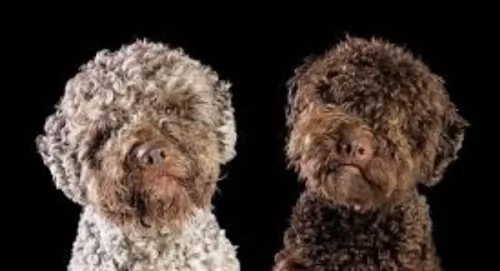 Not everyone agrees with how to take care of the Lagotto’s rough, waterproof coat of thick curls. The coat doesn’t shed much but it can pick up grass and small twigs easily. Unless brushed out at least 2 or 3 times a week, the coat can become matted and unruly. For many the coat needs to be trimmed regularly.
Not everyone agrees with how to take care of the Lagotto’s rough, waterproof coat of thick curls. The coat doesn’t shed much but it can pick up grass and small twigs easily. Unless brushed out at least 2 or 3 times a week, the coat can become matted and unruly. For many the coat needs to be trimmed regularly.
The Lagotto needs plenty of exercise. His hunting and retrieving past has given him a natural urge to retrieve and he loves going after every ball you throw him. He will also love to join you on your daily walks and it gives him the chance to sniff around. With swimming being added in, this dog is your true sporting buddy.
Make sure you feed your Lagotto the very best quality food there is to ensure his well-being and longevity. If you're unsure about whether he is getting in all the necessary vitamins and minerals with his food, speak to a dog expert as good food is key to a happy, healthy dog.